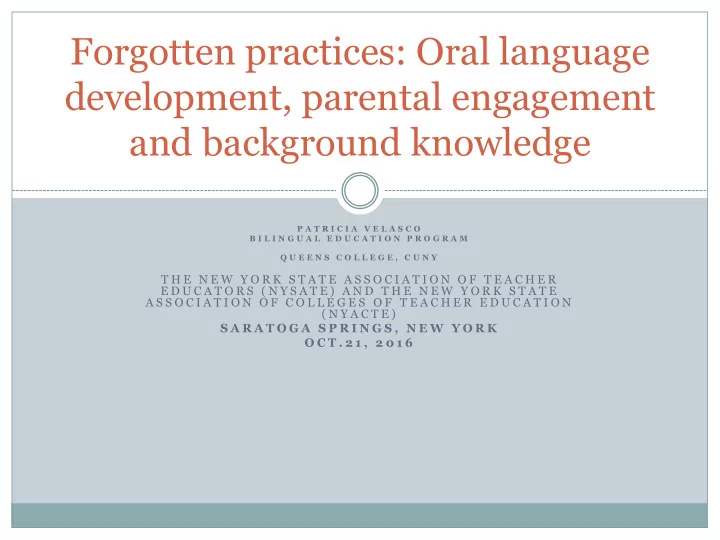

Forgotten practices: Oral language development, parental engagement and background knowledge P A T R I C I A V E L A S C O B I L I N G U A L E D U C A T I O N P R O G R A M Q U E E N S C O L L E G E , C U N Y T H E N E W Y O R K S T A T E A S S O C I A T I O N O F T E A C H E R E D U C A T O R S ( N Y S A T E ) A N D T H E N E W Y O R K S T A T E A S S O C I A T I O N O F C O L L E G E S O F T E A C H E R E D U C A T I O N ( N Y A C T E ) S A R A T O G A S P R I N G S , N E W Y O R K O C T . 2 1 , 2 0 1 6
Objectives Highlight the experience of teacher educators as we attempt to bridge the theory to practice. To deconstruct and problematize what it means to educate new teachers for increasingly diverse schools and classroom contexts. This presentation will focus on three aspects that have been put aside or ignored: Oral language development Parental engagement Background knowledge and reading comprehension
Oral language development Oral language development is the foundation for student learning. Students vary in their ability to use their existing language in order to learn. The oral language knowledge and competency of some students might be substantially different Escamilla and her colleagues from the demands of the consider that 25 % of the school curriculum. day should be spent having conversations
What is happening? Teachers and school administrators put pressure on children to read and write without having developed the oral language that would allow them to learn and extend their background knowledge and clarify gaps in information. The CCSS have Speaking and Listening Standards but these are not implemented because they are not ‘tested’ whereas reading and writing are.
Parental involvement vs. parental engagement Parental involvement: Parental engagement: Laundry list of behaviors Collaboration and erasing of boundaries Attending parent teacher conferences, Social origin is used as a way of chaperoning field trips, participating in accepting or rejecting and school activities (i.e. bake sales), individual even before parents having strict rules about TV interaction takes place. watching and homework completion
Can parental engagement be structured? If so, how? Parental engagement is technically addressed into once a Week forty minutes, after school time slots. However, principals and teachers report that parents don’t come. The question that we need to be asking is: What does it take to form compassionate teachers who show empathy and are willing to have an open dialogue and interaction with parents who do not know how the American school system works? Many parents are looking for teachers who can help them navigate the American school system.
Two examples of parental engagement Sharing a curriculum with Contacting parents parents through text messages Ms. Bard, a third grade Ms. Mohammad, a teacher, developed a second grade teacher, social studies unit sends a video to the based on the country of parents once every two origin where her weeks, explaining the students where coming curriculum that the from. The mothers took class will be over and developed the developing. She reports unit. excellent results.
Background knowledge and reading comprehension Breadth of background knowledge. Pressley 2009 states that “knowledge is not a singular entity, but consists of many diverse forms and dimensions . . . [and] what one knows is as likely to come from everyday out-of-school experiences as from formal learning” Depth or domain-specific background knowledge. As children learn more about various fields of knowledge, they develop a specialized sense of particular areas of study. This awareness is known as domain knowledge, and it is related to the study of specific subject matter.
“A rich diet of books: some easier, some more difficult ” Snow, 2013 Once a reading level has been assigned to a student, it technically represents a measure that covers all different genres and topics. In some cases, where schools don’t have the assessment tools in two languages, the reading level achieved in English is taken as a valid measure of reading ability in the two languages. The CCSS use lexiles (quantitative measure of vocabulary and sentence complexity) to provide a text with a score and by assessing students’ oral reading a score a ‘match’ between the lexile level and the students reading proficiency is established. There is no research, however, confirming that matching students to texts improves the development of reading comprehension.
An example of Depth or Domain Specific Background Knowledge Anchor Standard 10 in the Common Core Learning Standards for Reading demands that students “ read and comprehend literary and informational texts independently and proficiently .” NYSED Bilingual Common Core Initiative (BCCI) has embedded the notion that domain specific background knowledge plays an important role in reading comprehension. The example that is portrayed in the BCCI refers to books about the human body that extend different levels and in different languages: https://www.engageny.org/resource/new-york-state-bilingual- common-core-initiative
Recommend
More recommend